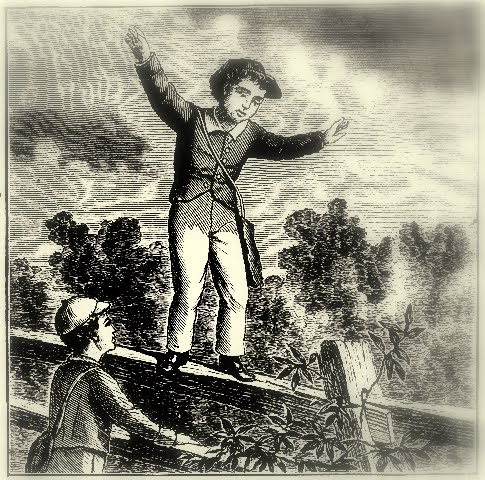
Both my kids would grab at it with chubby, semi coordinated moist little fingers. they stared, scowled, and when they were old enough, each asked (separately) what that gouge was in the middle of my forehead.
Well, I said, I got that one day when I decided to walk through the neighborhood and see everybody’s back yard. Yes. I was straddling the fence.
For the first 30 feet or so, it went well. I was a ten year old boy with, as I remember it, cat like reflexes and superb balance. So, like my older brother, who had put the idea in my head, and not without more than a little exaggeration as to how how far HE made it, I set out to see the world.
Until the fence changed.
About 30 feet into walking on the fence, the fence abruptly changed its construction from a series of 1×6 uprights topped with a dado joined 2×4, to just the uprights without the 2×4.

I didn’t see it until I ran out of 2×4 and had little time to do anything but bail out. I remember thinking I better jump over into the Stevens back yard, they were slow and old, and by the time the could do anything, I could have bailed over the fence back into my own back yard, and no one the wiser.

Except for the aloe vera plant, I would have pulled it off. Sailing by most of the large, old cactus, my forehead was gouged by a tip of one of the fronds, making a sizable dent in my forehead, which is still there, 40 odd years later.
You and I engage in fence straddling from time to time. Hesitation when asked about a religious question, maybe the occasional curse to impress someone that we too, are tough hombres. Lingered temptation on a web page, we all face them.
God knows this. He knows what’s best for us is to make a decision one way or another, without peer pressure, which for the Jews in Nehemiah’s day consisted chiefly to mixed marriages, which brought compromise.
And compromise always ends in being stung or poked or bleeding. Just ask any 10 year old fence straddler.
Summary / Thoughts
| Nehemiah 7:1-7a | His appointment of his brother helped in a crucial area. Chapter Six recorded much treachery by outsiders, and deep disappointments. Nehemiah needed a faithful reliable person to guard the city. Are we that person?Why would God put it in the heart of Nehemiah to enroll the city ion a census? Perhaps to discern who was Jewish. This would be important because
|
| Nehemiah 7:61-65 | As discussed before, priests were not allowed to take Gentile wives or harlots. Lev 21:7, 14 |
| Nehemiah 7:66-73 | All in all, there were about 50,00 people including the help |
Washed in the Word
| Nehemiah 8:1-2 | This is the Jewish New Year, Rosh Hashanah. the Feast of Trumpets. Later in the month, on the 10th, was Yom Kippur, the Day of Atonement, for the sin of the nation, and after this the feast of Booths, Tabernacles. The fulfillment of this is the return of Jesus, see Mat 24:31, 1 Th 4:16-17 and 1 Cor 15:51-52Gathered as one man. A sign of the work of the Holy Spirit drawing them together. Eph 4:3-6. The term here is used as all being united for a angle purpose, to honor God through attentive hearing of His Word. |
| Nehemiah 8:3-8 | This is the first mention of the term podium or platform.Standing up, hands lifted, in order to praise God. Bowing down low to worship Him. The difference? Praise is exuberant, and can be given to anyone deserving it for righteous acts. Worship, is for God alone (Luke 4:8). It is the undoing and handing over in complete surrender and acknowledging His lordship over us. (Psalm 95:6)
Translating it to give sense, many of the people did not know Hebrew, but rather Aramaic, and in some cases, the foreigners (wives of prioress, knew openly the language of the Philistines! Neh 13:24 This is also the purpose of the priest, to make application of the Word they heard, much like the purpose of the pastor/teacher of the church. |
| Nehemiah 8:9-12 | The weeping was in response to convicted hearts by the reading of the Law. Mat 5:3-4, Romans 7:7. The Law has done its work in the people by bringing them to recognizing their sin.We tend to downplay this in our conversations, in the pulpit, in preaching the Gospel; it’s not an was topic to broach, but is is necessary, because if I speak to someone who I tell that Jesus can save them from their sin, they don’t think they have a problem. It takes the Law to show us that we are sinners, without the Law, the Gospel is a head scratcher to a non-believer.
The right thing to do afterward is party! Deu 12:7, 12 commands this, we are free, we are cleaned, and this is the proper mode of living, celebrating, and sharing this with those less well off Deu 26:11-13 |
| Nehemiah 8:13-18 | The people had not only turned back to the words of the Law, but it’s plain meaning and were obedient to it. Shavout was celebrated since the time of Joshua, but not in a Booth prescribed by God.This kind of obedience results in joy, really interpreting and being liberated by God’s Word, understood as it was intended to be understood, plain interpretation where warranted. |
Memory Verse – They read from the book, from the law of God, translating to give the sense so that they understood the reading. Nehemiah 8:8
Application – Repent and grieve your sin, but then rejoice, you are bought and paid for!